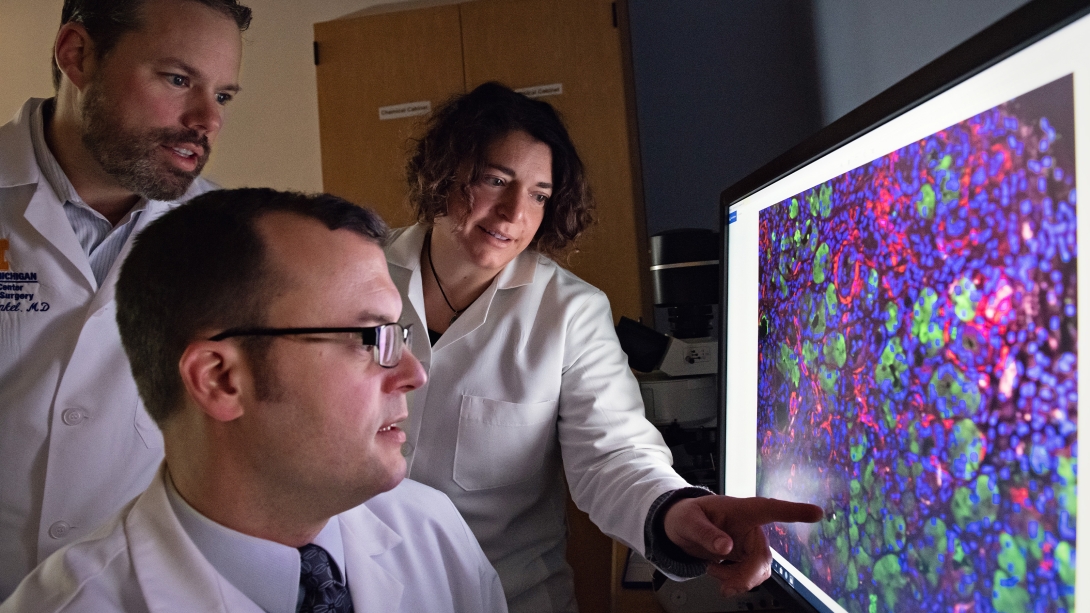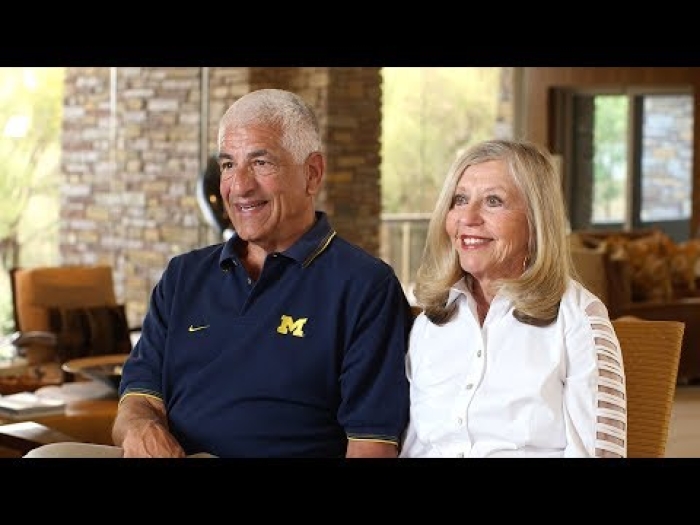New Rogel and Blondy Center for Pancreatic Cancer will bring together researchers and clinicians to drive forward new treatments and improve outcomes for this challenging cancer
10:10 AM
Author |

ANN ARBOR, Michigan — With a $50 million gift from Richard and Susan Rogel, the University of Michigan Health Rogel Cancer Center aims to revolutionize how the world detects, treats and ultimately cures pancreatic cancer.
The gift will create the Rogel and Blondy Center for Pancreatic Cancer in honor of Max Rogel and Allen Blondy, Richard and Susan Rogel’s fathers, both of whom died from cancer. It will provide support for clinical care and translational research, playing to the strengths of the Rogel Cancer Center’s current robust team of 60 doctors and scientists from 10 departments already working in this area.
This is the first major gift announced during the public phase of the Look to Michigan fundraising campaign, which Richard Rogel chairs for Michigan Medicine and co-chairs at the university level. The Rogels, longstanding supporters of the University of Michigan, gave $150 million to the cancer center in 2018, which led to the center being named in their honor.
The Rogel and Blondy Center for Pancreatic Cancer reflects a bold vision to provide resources around a specific disease to achieve transformative impact that cannot be supported by typical grant funding. In this case: doubling the survival rate for pancreatic cancer in the next 10 years.
“My hope is in 10 years they’ll surpass the goal of doubling the survival rate and that Michigan will be the place everyone wants to go for pancreas cancer care. I think we can make a horrible disease a lot more tenable and maybe even cure it,” said Richard Rogel, who recalls his father’s painful death at age 73 from pancreatic cancer. Allen Blondy died from melanoma.
Pancreatic cancer remains one of the deadliest of the major cancers, with a five-year survival rate of only 13%.
“Our team of dedicated researchers and providers is already having a major impact for pancreatic cancer patients and the field. With this generous and visionary gift from Rich and Susan Rogel, we will fuel new initiatives and innovations and strengthen our foundation of excellence in care, discovery and training,” said Eric R. Fearon, M.D., Ph.D., director of the Rogel Cancer Center.
Pancreatic cancer is complex and stealthy, often escaping notice until it’s advanced and has spread in the body. Rogel researchers have been at the forefront of mapping the tumor microenvironment and understanding how to target tumor metabolism for potential therapies. Their work has contributed to notable improvement in the survival rate from single digits only five years ago.
“Philanthropy has been a driving force behind our major advancements in pancreatic cancer. Our work will be a community success story. The faster we grow our program, the faster we can advance understanding of pancreas cancer and new approaches to save lives,” said Marschall Runge, M.D. Ph.D., CEO of Michigan Medicine and dean of the U-M Medical School.
“We are profoundly grateful to Rich and Susan Rogel for their extraordinary and farsighted gift, as well as their sustained and great-hearted support of the university and their leadership in our Look to Michigan campaign,” said Santa J. Ono, Ph.D., president of the University of Michigan. “Their gift will be transformative for Michigan Medicine, opening new discoveries, redefining treatment and even saving and extending lives.”
The new Rogel and Blondy Center will be led by Marina Pasca di Magliano, Ph.D., Maud T. Lane Professor of Surgical Immunology; Costas Lyssiotis, Ph.D., Maisel Research Professor of Oncology; and Timothy Frankel, M.D., Maud T. Lane Professor of Surgical Oncology.

The gift includes support for four strategic pillars:
- Enhancing and expanding access to world-class patient care
- Innovating and advancing discovery and translational research
- Accelerating new treatment options through clinical research and clinical trials
- Investing in infrastructure, including a biobank and leading-edge research technologies
“This is unlike anything we’ve ever done before. It’s not how scientists normally think. Instead of getting grants to go from A1 to A2 to A3, they can now think long-term about going all the way from A to Z,” Rogel said. He described a friend whose brother is being treated for pancreatic cancer and the challenges they’re facing. “If we could take that suffering out of the equation, it would be the greatest thing I ever did.”
About the Rogels
Longtime supporters of the University of Michigan, Richard and Susan Rogel have dedicated much of their lives to helping others, including patients, students and medical researchers. This gift brings their total commitment to the Rogel Cancer Center to more than $200 million. Having supported at least 18 different areas across the University of Michigan with total giving of nearly $250 million, the Rogels are some of the largest individual donors in university history.
The Rogels have embraced volunteer leadership roles throughout the university, including advising university presidents and provosts as well as chairing and co-chairing two previous record-breaking university fundraising campaigns. Richard chairs a national advisory board for the Rogel Cancer Center and is a member of the Michigan Medicine Advisory Group and Frankel Cardiovascular Center National Advisory Board, among many others. Susan has served on committees benefiting U-M Health C.S. Mott Children’s Hospital and Von Voigtlander Women’s Hospital, among many additional efforts.
The Rogels live in Avon, Colorado, and Scottsdale, Arizona. Richard serves as president of the investing firm Tomay Inc. A native of New Jersey, he is the founder and former chairman and CEO of the Preferred Provider Organization of Michigan, which was the first PPO in the country.
About the Rogel Cancer Center
The University of Michigan Health Rogel Cancer Center is committed to improving the health and well-being of people who have – or are at risk of getting – cancer. As a National Cancer Institute-designated comprehensive cancer center, our more than 500 members work to prevent cancer, improve outcomes for those diagnosed, and improve quality of life for cancer patients and survivors. Among 24 areas of specialty, our multidisciplinary cancer clinics offer one-stop access to teams of specialists who develop personalized treatment plans for each patient.
Learn more at rogelcancercenter.org or call the Cancer AnswerLine at 800-865-1125.
About Michigan Medicine: At Michigan Medicine, we advance health to serve Michigan and the world. We pursue excellence every day in our 11 hospital and hundreds of clinics statewide, as well as educate the next generation of physicians, health professionals and scientists in our U-M Medical School.
Michigan Medicine includes the U-M Medical School and University of Michigan Health, which includes the C.S. Mott Children’s Hospital, Von Voigtlander Women’s Hospital, University Hospital, the Frankel Cardiovascular Center, Kellogg Eye Center, University of Michigan Health-West, University of Michigan Health-Sparrow and the Rogel Cancer Center. The U-M Medical School is one of the nation's biomedical research powerhouses, with total research funding of more than $777 million.

Department of Communication at Michigan Medicine

Dean, U-M Medical School
McKay Professor
Executive Vice President, Medical Affairs, University of Michigan
Chief Executive Officer, Michigan Medicine






